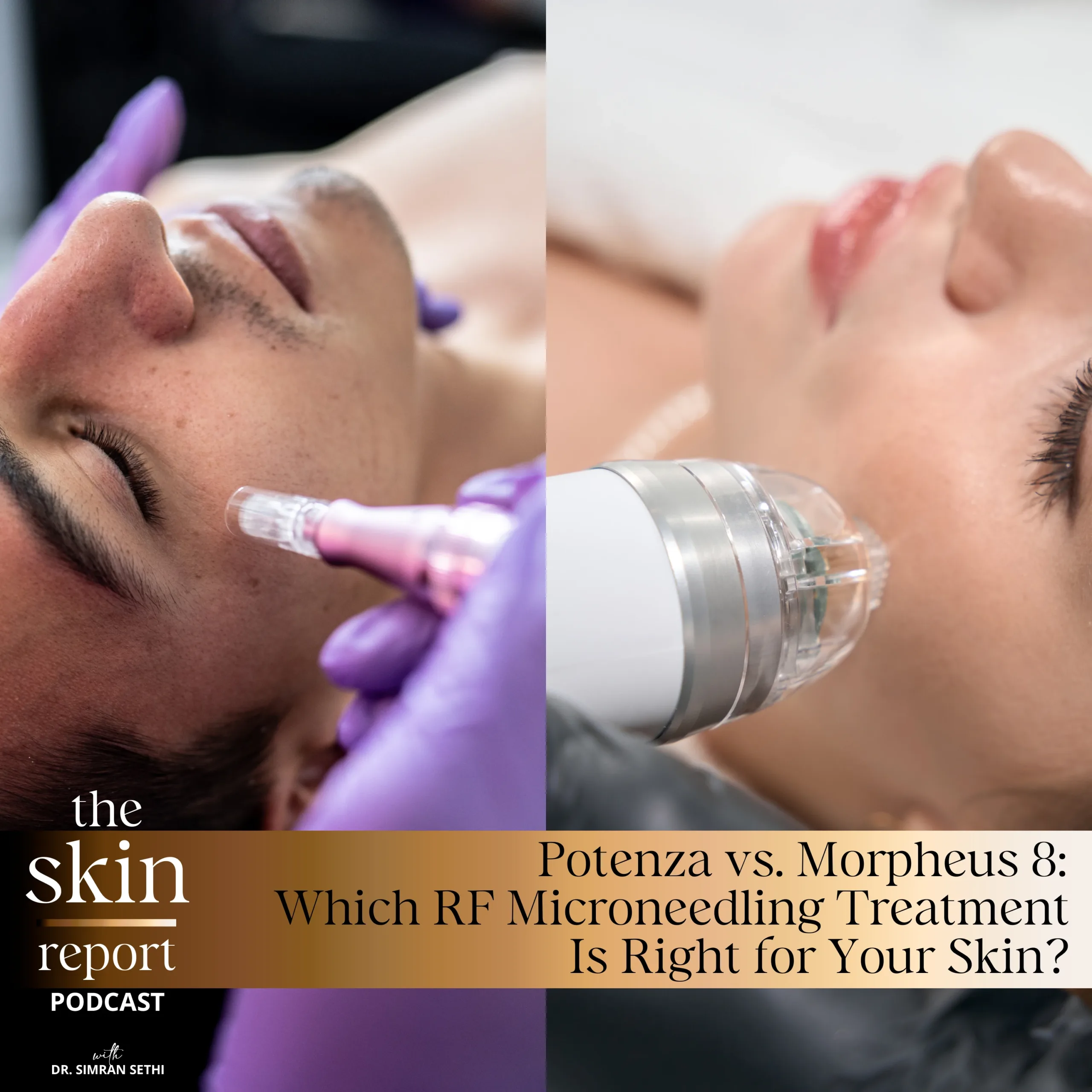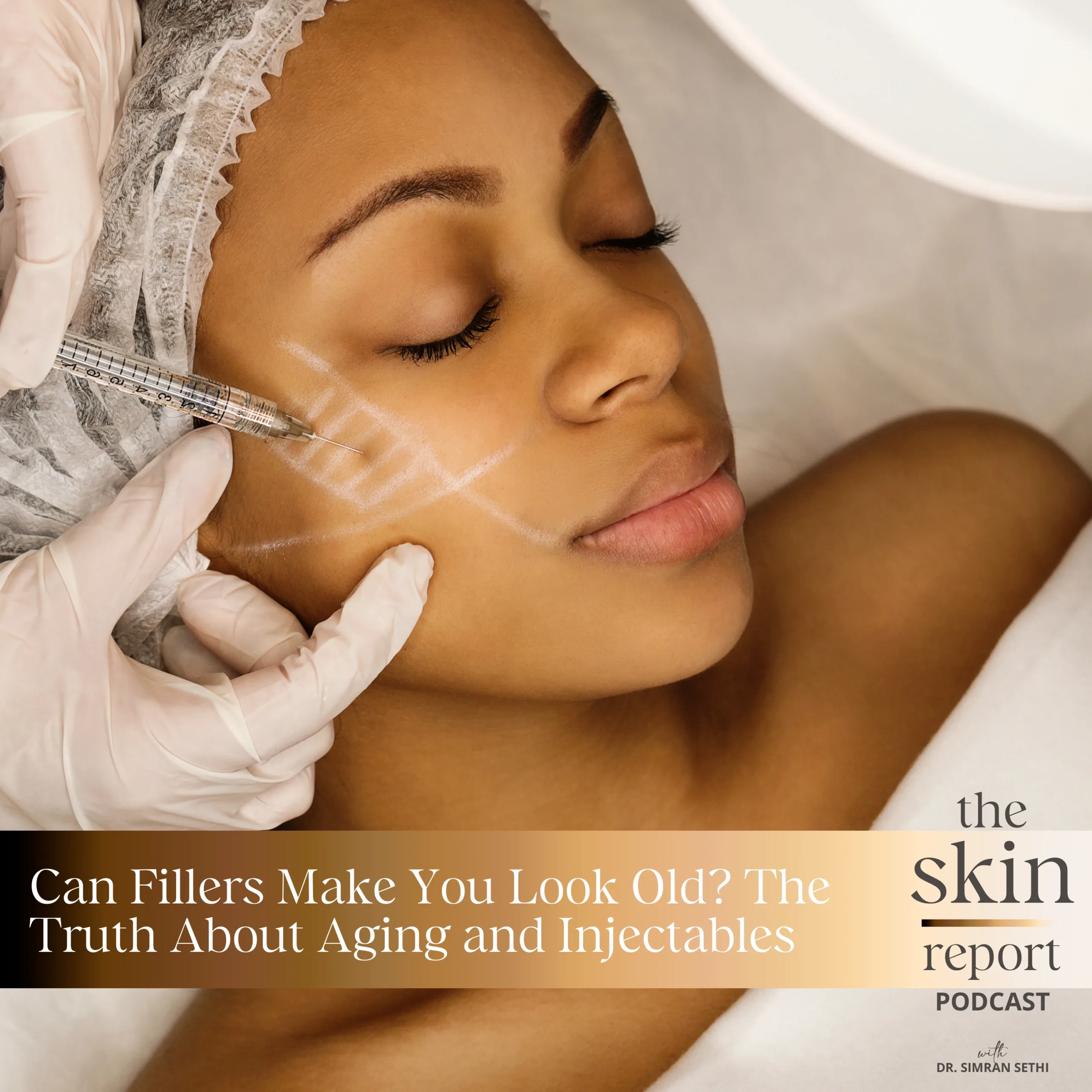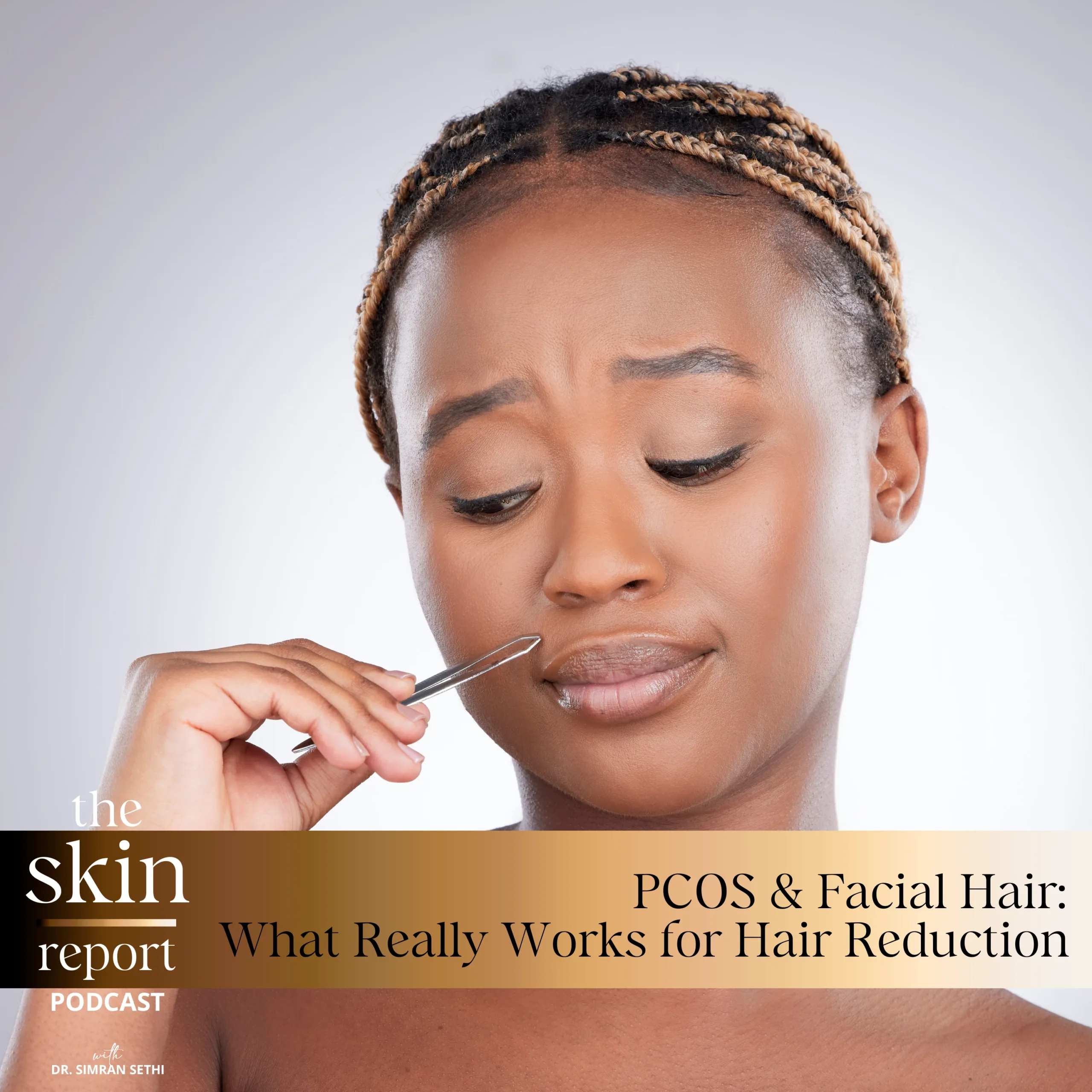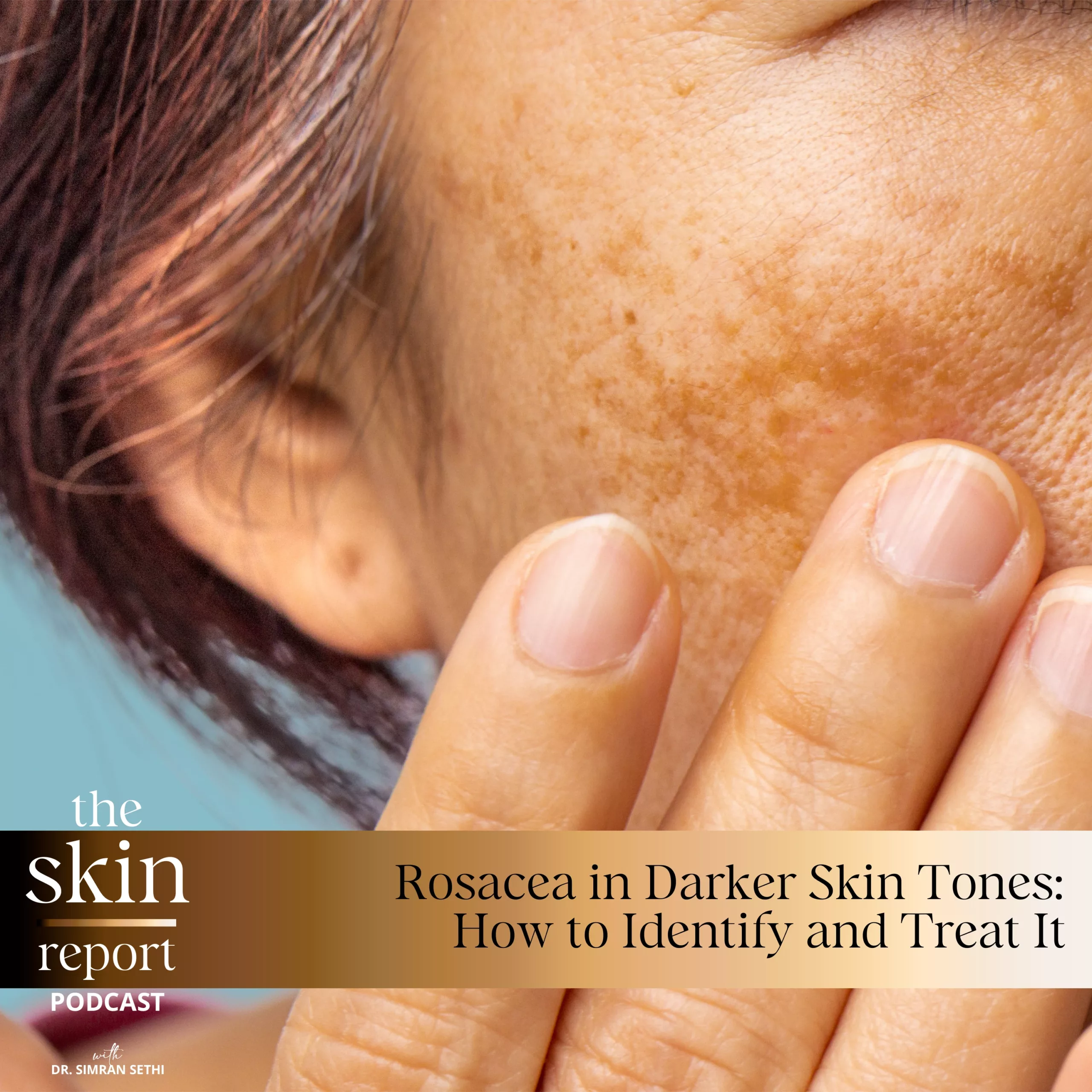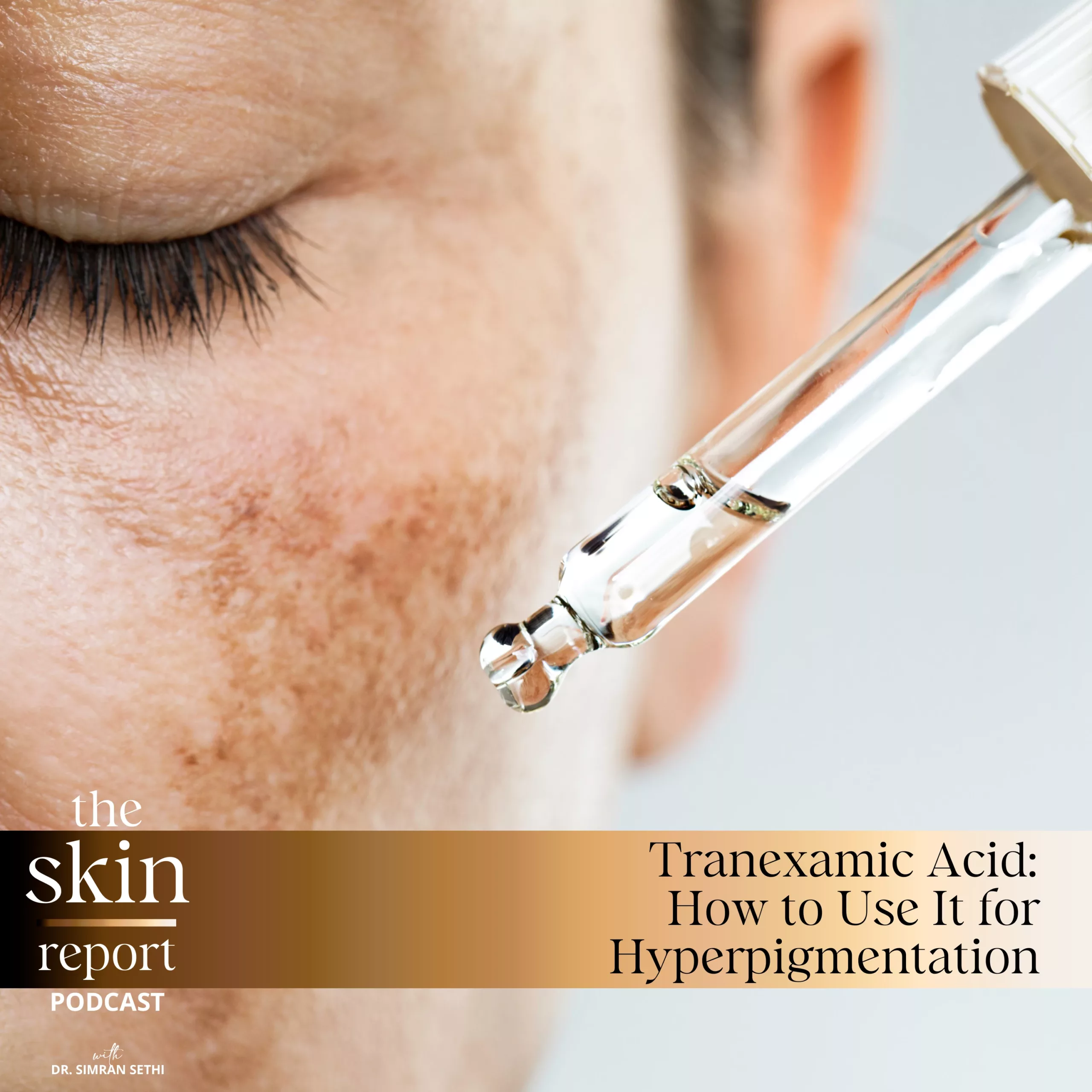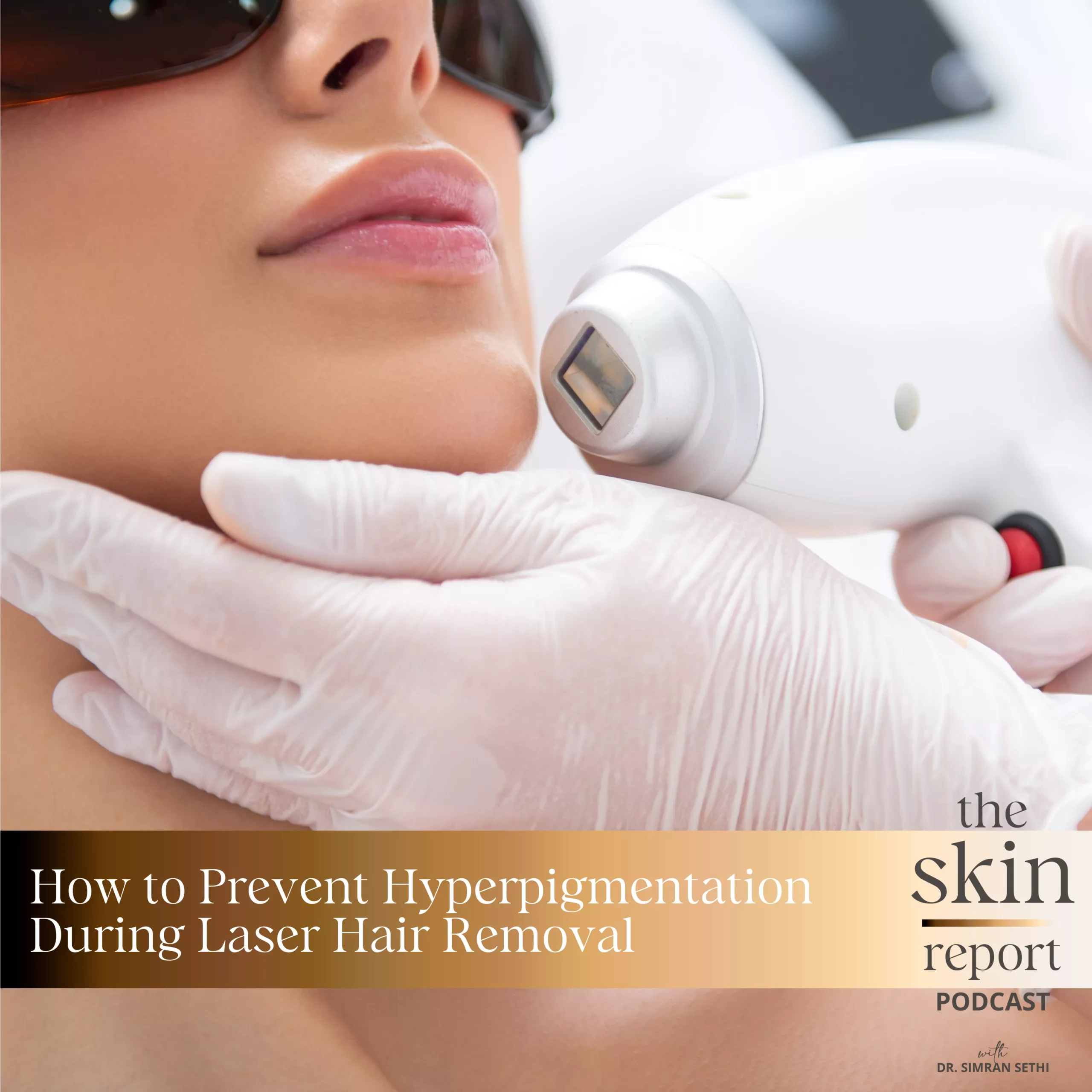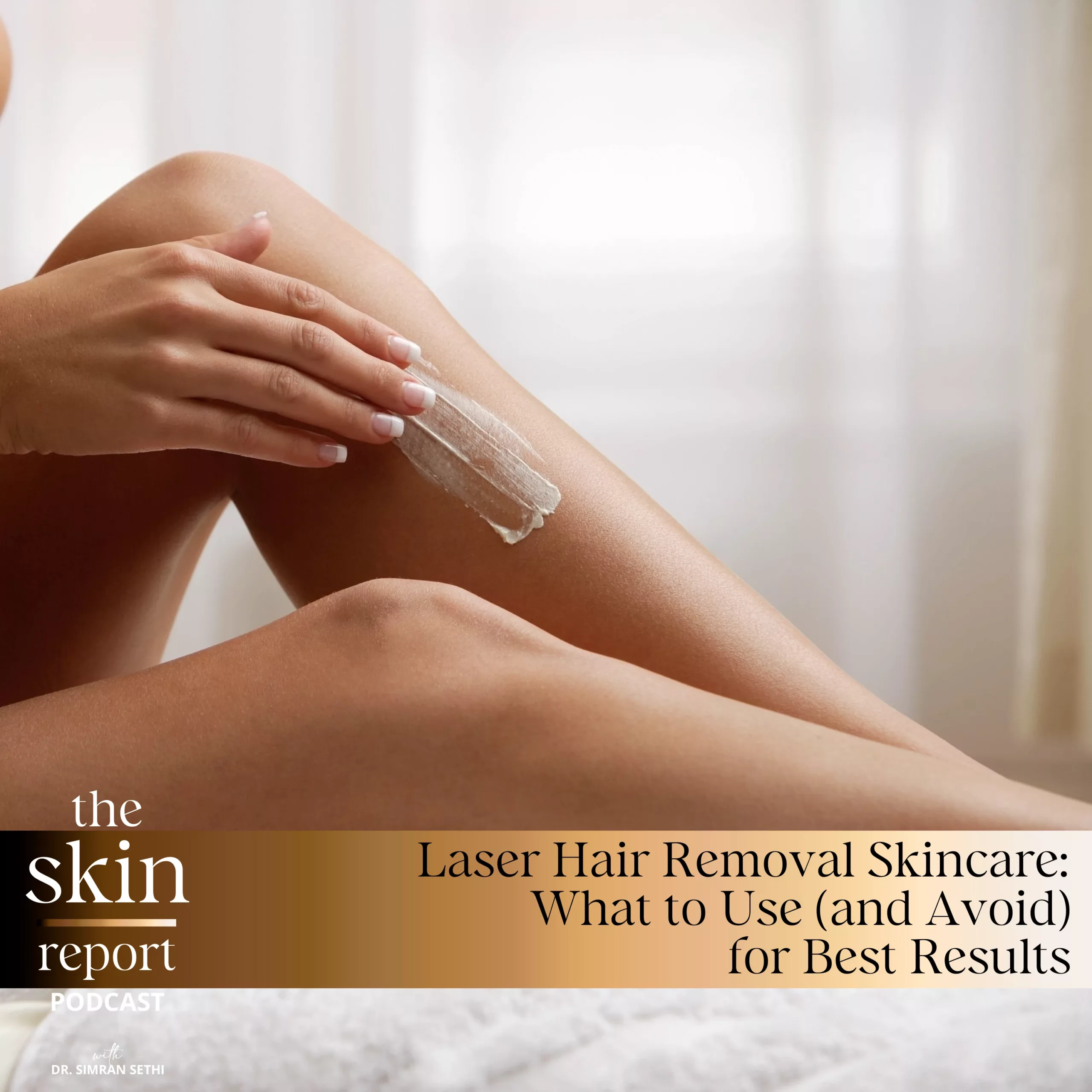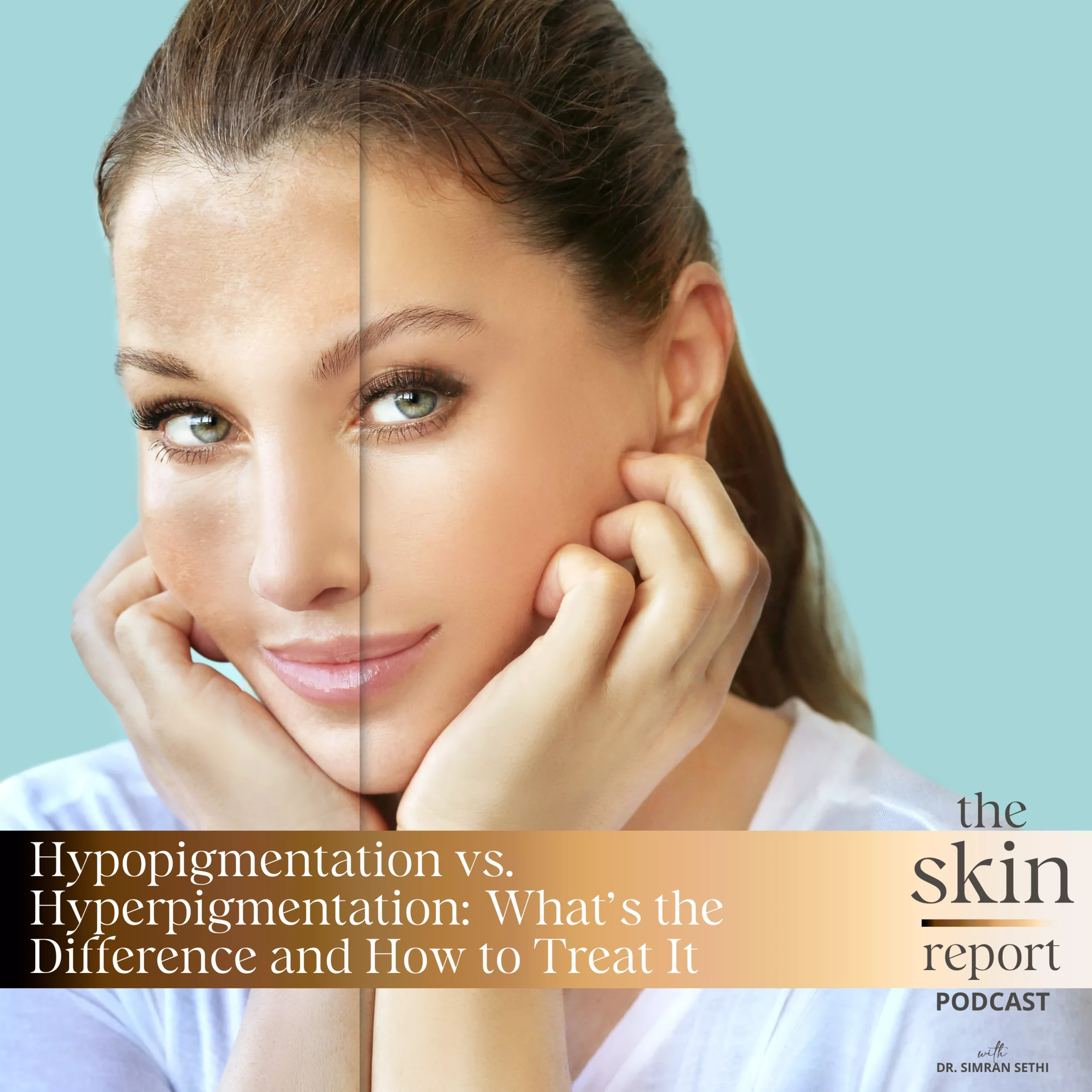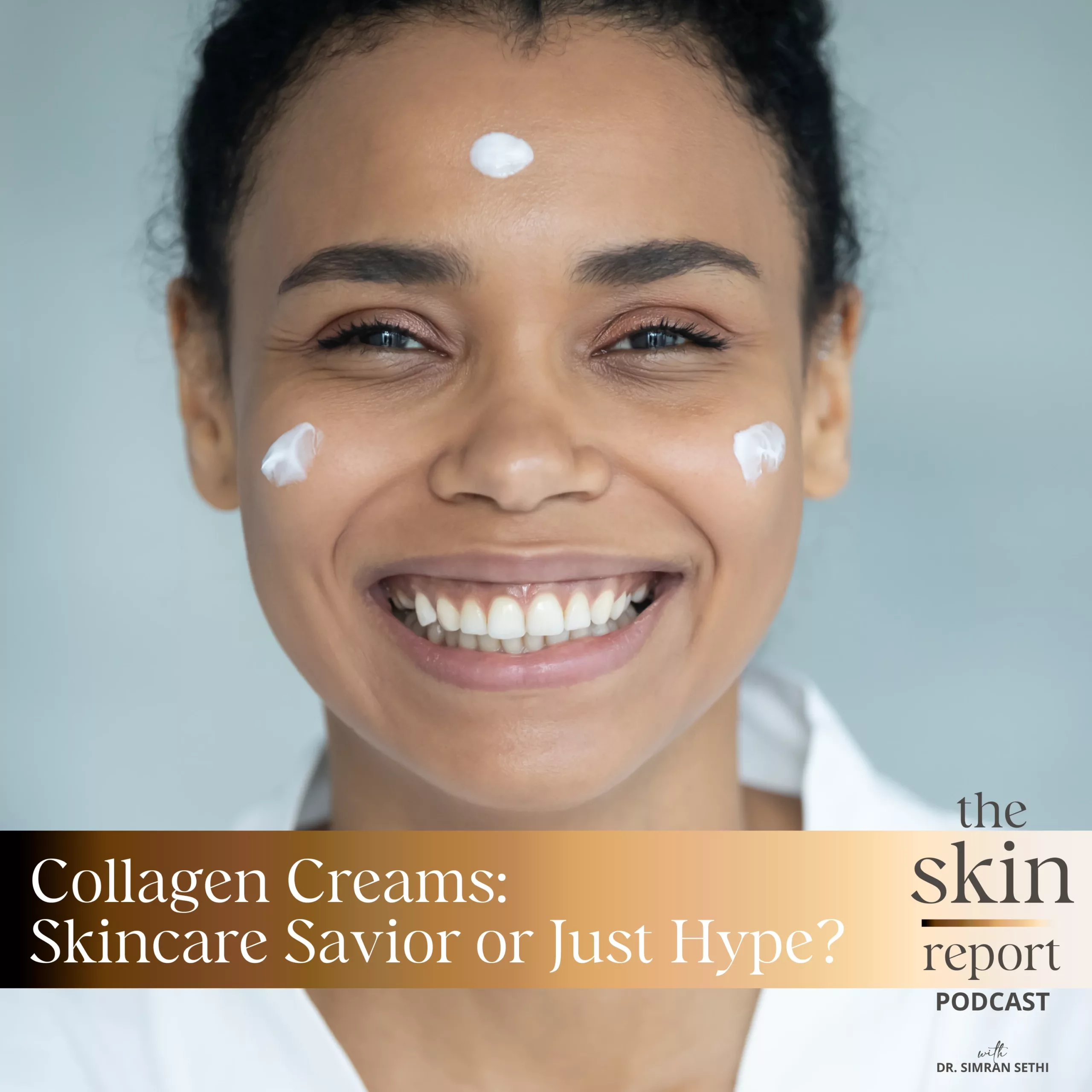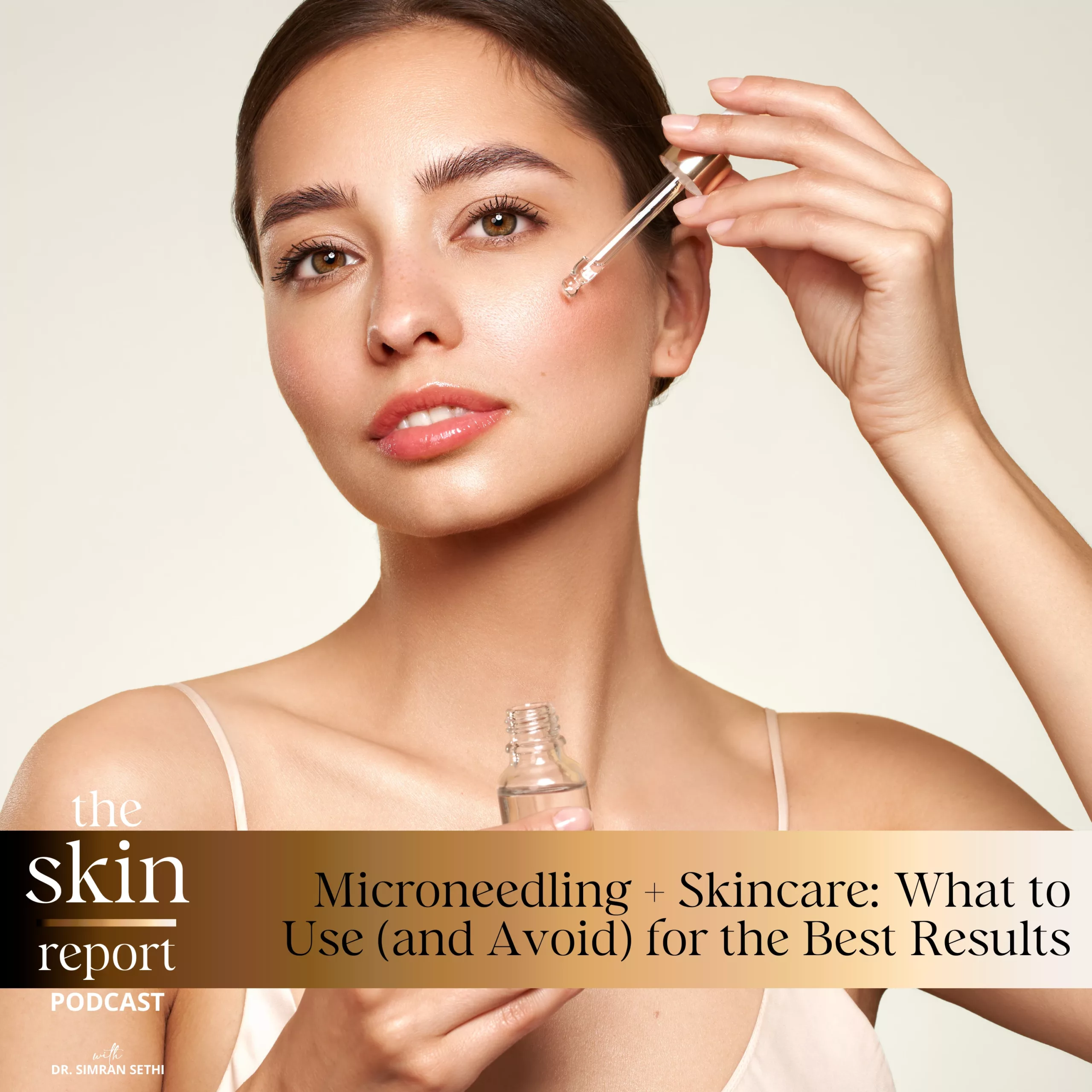Buyers Guide to Retinol
Retinol is a powerful element in a skincare routine. It can help you turn back the clock by reversing the effects of fine lines and wrinkles. Retinol also fights acne and inflammation. A good Retinol product will benefit your skin by increasing the cell turnover rate and stimulating collagen production. So how can you choose the right retinol product to experience its perks?
The Skin Report is a podcast created to educate listeners on methods to improve skin health for people of all ethnicities and ages. On this episode, host Dr. Sethi teaches listeners the ins and outs of retinol and how they can buy the best Retinol product to transform and rejuvenate their skin. She discusses what to look for and avoid when shopping for retinol skincare. Listeners will learn the difference between retinol serums and creams, how to choose strength retinol and the best type of retinol product packaging. Finally, Dr. Sethi analyzes some of Byrdie’s highest-rated retinol products at different price points. This retinol buyer’s guide episode is an excellent resource for anyone looking to incorporate a retinol product within their skincare regimen!
As the founder of RenewMD Beauty Medical Spas and a woman of color, Dr. Sethi shares her experience and knowledge in skincare elements and products. So expand your skincare knowledge and learn how to choose the best retinol product in this episode!
Follow and DM a question for Dr. Sethi to answer on The Skin Report Podcast:
Renew Beauty Instagram:
https://www.instagram.com/renewmd_beauty/
RenewMD Beauty Medical Spas, California:
https://renewmdwellness.com/
Dr. Sethi on TikTok:
@SkinByDr.Sethi
Skin Cycling Duo Special Offer 20% off Promo Code:
SKINREPORT20
Skin By Dr. Sethi – Retinol Lipid Complex:
https://skinbydrsethi.com/products/retinol-lipid-complex
Skin By Dr. Sethi – Does Retinol Dry Out Your Skin? Truth or Myth:
https://skinbydrsethi.com/blogs/skin/does-retinol-dry-out-your-skin
Skinbetter Science:
https://store.skinbetter.com/alpharet-overnight-cream-30-ml
This transcript was exported on July 25, 2023 -view latest version here.
Skincare can sometimes feel overwhelming, whether it’s finding the right products, ingredients, or treatments. There’s a lot out there, but not always for people of African, Hispanic, Middle Eastern and Eastern South Asian descent. That’s why I set out to educate myself and others so that we can all feel beautiful in our skin.
Hello and welcome back to The Skin Report. I’m Dr. Simran Sethi, an internal medicine doctor, mom of three, and CEO and founder of Skin by Dr. Sethi and Renew MD Medical Spas.
On today’s episode, I want to talk about how to select the best retinol products and bust down some of the favorites listed by Byrdie. If you’ve been listening to the show for a while now, you know the power of retinol. A derivative of vitamin A, retinol products can help fight acne, scarring and reverse fine lines and wrinkles. It targets these issues by increasing our skin cell turnover rate, stimulating collagen and fighting inflammation. Unlike the trendy treatments of the month, retinol has decades of scientific study backing its skincare prowess, which you can hear more about in season one, episode 36 of The Skin Report. I’ll have it linked in the show notes so you can check it out.
Due to the numerous benefits of retinol, it appears in many skincare lines. With some formulations being more helpful than others. Therefore, finding the right retinol product can be challenging, but that’s why we’re having this episode today. I want to explain what to look for and what to avoid when choosing your retinol product.
First, I’d like to tackle what type of product you should consider picking up, a retinol serum or cream. As we spoke about during our moisturizer episode, a serum is going to deliver a much higher concentration of the active ingredient to the skin. This allows deeper penetration of the product, so that your skin has a better chance of absorbing the benefits. However, strong serums may not be right for everyone, especially if you have dry or mature skin. Creams on the other hand tend to be gentler. Many retinol creams include other hydrating ingredients that can help counter the harshness of retinol itself. For example, my Retinol Lipid Complex pairs the power of retinol with the moisturizing effects of lipid, so that the product is safe for all skin types and tones. So, whether you opt for a serum or cream comes down to your needs, skin tone and type. We’ll dive into this further in the episode.
Next, when choosing a product, you want to keep in mind the concentration of the retinol itself. 0.5% is considered a medium-strength product with strong products offering 1% concentration or higher, a lesser concentration would be below 0.5%. I personally believe that 0.5%, the middle road, is the way to go for most skin types and tones. Anything under 0.5% will not be concentrated enough to deliver the numerous benefits of the retinol, and at that point, you’re wasting money no matter what the price point. With this logic, you may feel that the 1% or more is the best option as it’s the highest strength. However, retinol is an intense ingredient and the 1% formula can backfire, especially for skin of color, causing hyperpigmentation and even scarring. Additionally, many studies have shown that while 1% will get you visible results sooner, it will not give you better results with time when compared to the 0.5%. The look and feel of your skin when using 0.5% will look the same as it would when using 1%.
Remember, we are picking a retinol product that is sustained for our skin and our skin routine. We don’t want something that works quickly, but harshly, triggering side effects and issues we will have to address. So, for this reason and more, I opt for a medium-strength product that is safe for all skin tones, but just as effective as a higher dosage. Before we get into specific products, I want to touch on the packaging your retinol comes in. You may recall we spoke on something similar during our vitamin C episode. The reason for this is that the way in which certain ingredients are stored can impact their effectiveness. With vitamin C, which tends to oxidize quickly, the wrong type of packaging can render it useless. For retinol, there’s some overlap.
If you are familiar with how retinol is incorporated into a routine, you may know that it should be applied only at night. This is for several reasons. The first is that retinol makes your skin more sensitive to UV rays, and most importantly, starts breaking down in the sun. If your packaging is not opaque, the retinol will break down just while sitting on the shelf. Even tinted bottles don’t offer enough protection from UV rays to maintain the stability of the product. The best way to store retinol is in completely opaque, airless packaging. While it’s a nighttime-only product, the retinol packaging is still important, so that the active ingredient isn’t rendered useless with sun exposure.
When we return, we’ll take a look at some of Byrdie’s highest-rated retinol product, both serums and creams, at different price points.
The first and least expensive product on the Byrdie list of best products of 2023 is the Neutrogena Rapid Wrinkle Repair Retinol Serum. This serum contains a 0.3% accelerated retinol sustained release. A strained release retinol, meaning it works throughout the day. I have not seen any strong data to suggest that a sustained release retinol is more effective than a non-sustained release retinol. The concentration is just below my recommended dose, so while it’s safe for every skin tone, it may not be as effective as other products we’ll talk about today.
Additionally, there are synthetic fragrances which I’m never a fan of for many reasons, including skin sensitivities and allergies. As we’ve mentioned on the show before, skincare companies add synthetic or natural fragrances to give their formulas a neutral or appealing smell. However, this can leave buyers with bad reactions to the product. Therefore, I’m always a fan of natural ingredients that neutralize any smells.
Next, I want to talk about the popular Olay Regenerous Retinol 24 Moisturizer. At $35, it’s more expensive than Neutrogena, but is it worth it? It’s fragrance-free, affordable, and contains hydrating ingredients, like niacinamide. Niacinamide, a form of vitamin B3, also helps reduce the appearance of dark spots. However, I worry that this Olay product falls into the jack of all trades, master of none category. I can’t find the retinol concentration listed, nor the amount of niacinamide. So, while a hydrating cream, it may not be impactful in reaching your goals, whether anti-aging, acne, or both. There are other retinal products out there that promise and deliver a lot.
At around the same price point, you can find Paula’s Choice Intensive Repair Cream. This rich cream contains peptides and jojoba seed oil, which help to hydrate and repair the skin barrier. This product is well-suited for dry, mature skin. Additionally, it’s fragrance-free. While it contains retinol, it’s only at a 0.01% concentration, which is not enough to offer the powerful anti-aging acne fighting properties. I believe that while this may be a great moisturizer, it isn’t a great retinol product.
After the break, we will cover the higher-end items, and if they’re worth the price tech.
First, I want to tackle the Peter Roth Thomas Retinol Fusion PM Night Serum. At $65, it provides encapsulated retinol, vitamin C, vitamin E, and squalene. Let me take a minute to explain what an encapsulated formulation does. Encapsulation helps improve shelf life and stability of a product. And in my opinion, if your skincare product, including retinol is in opaque and airless packaging, you achieve the same level of stability as encapsulation. So, while this product comes in a dropper bottle, which can sometimes destabilize the retinol, the encapsulation ensures that that does not happen. The vitamin E and squalene ensure that this product is hydrating to the skin. However, the concentration is 1.5% retinol and it contains vitamin C. As the product comes in a dark dropper bottle, I fear the vitamin C would oxidize and be rendered ineffective after a short amount of time exposed to the air.
This serum is going to be too harsh for many skin types and tones, especially skin of color and mature skin. There is an increased risk of irritation, hyperpigmentation and more. While it may get you fast results, it may not fit well into a sustainable skincare routine.
Next, I want to talk about the SkinBetter Science AlphaRetinol Overnight Cream. At $135, this cream is the priciest on the list, and with good reason. Award-winning, this formula contains a combined ingredient known as AlphaRet, which is a retinoid combined with AHA, an exfoliating lactic acid. To balance out the potential harshness of the active ingredient, the cream contains ceramides, squalene, niacinamide, and hyaluronic acid. All these ingredients are hydrating and moisturizing to counter the dryness that can occur with retinol. In addition, this product has green tea extract to calm the skin, and vitamin C and E to help fight free radicals. It’s also fragrance-free, paraben-free, cruelty-free, dye-free, and vegan. I like the combination of products in this, but from experience, know that the addition of an AHA can make this too strong a formula for mature, dry and skin of color. If you have any of these skin types, this formula may be a little too aggressive and at risk of breaking down your skin barrier.
And finally, I have to be honest, $135 is a lot to spend on just one fluid ounce. This is why my Retinol Lipid Complex is less pricey, but like the SkinBetter Science cream, is also fragrance, paraban, and cruelty-free. Additionally, it’s vegan, medical-grade, and clinically-tested. My 0.5% retinol and glycolipid combo is safe for all skin tones and types. It delivers the anti-aging and acne-fighting effects of retinal products without being watered down with too many other ingredients. However, like I said, it’s safe for all skin types and tones because it’s also a hydrating formula. The glycolipids prevent the dryness and skin irritation that happens to those with skin types four and greater, and with stronger retinal concentrations. The lipids also then prevent hyperpigmentation that can occur as a result of this irritation and flaking.
Overall, just to summarize. If you are fighting acne, you may want to go on an alternative treatment of retinol and tretinoin, which we will discuss in a later episode. If you’re using retinol just to keep your skin clear of hyperpigmentation, fine lines and build collagen, a medium-strength paired with a hydrating moisturizer, either within or on top of the retinol, would be a great way to incorporate it into your skincare routine.
I hope you enjoyed and find this episode on buying your retinol helpful. If you’d like more of this content, let us know. We are a women of color owned brand and any likes, reviews, ratings and shares truly help to boost the podcast and get it in front of others, like yourself. Thanks for listening. And until next time, love the skin you’re in and celebrate your beauty.
If you’d like to learn more about science-backed skincare or medical aesthetic treatments, please subscribe to and turn on notifications for The Skin Report, so you always know when a new episode is up. We have a newsletter that you can sign up for on theskinreportbydrsethi.com, so that you can stay up to date on all our new episodes, blogs, products, and more. Additionally, if you have a skincare question or want to make an episode topic recommendation, please message me at theskinreportbydrsethi.com, which is linked in my show notes, and I’ll be sure to answer your question in an episode soon. We’ve received some great questions so far and I will try and answer them at the end of every episode, so keep them coming.
Transcript by Rev.com


